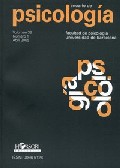Sesgos atencionales en análogos subclínicos con depresión y ansiedad social
Keywords:
Social anxiety, Depression, Attention, Cognitive Biases, Beck's Theory.Abstract
This study investigated selective processing of emotional information in social anxiety and depression using un attention deployment task designed by MacLeod, Mathews and Tata (1986). Control subjects and subjects with subclinical levels of depression and social anxiety completed the task to assess potential attentional biases toward carefully selected trait adjectives varying along the dimensions of valence (positive versus negative) and content (depressive, socially anxious, both depressive and socially anxious, and both depression- and social anxiety-irrelevant). Depressed subjects showed an unbiased attention to negative andpositive information, whereas socially anxious subjects tended to show un attentional bias toward negative socially anxious information and control subjects tended to show an attentional bias against negative socially anxious information. Results are discussed in the light of the theories of Beck and Williams, Watts, MacLeod and Mathews on cognitive differences between anxiety and depression.Downloads
Published
1997-01-13
Issue
Section
Articles
License
The authors who publish in this journal agree to the following terms:
Authors transfer to the publisher all copyright for the full term of protection and for all the world.
The authors can post a copy of their articles in accordance with the policy of free access to the journal.


